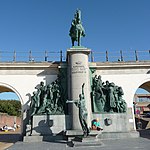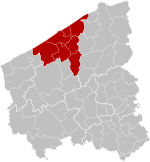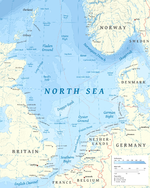COREtec Dôme
Basketball venues in BelgiumBelgian sports venue stubsBuildings and structures in West FlandersIndoor arenas in BelgiumOstend ... and 2 more
Sport in OstendSports venues in West Flanders

COREtec Dôme, is a multi-purpose indoor arena that is located in Ostend, Belgium. COREtec Dôme has a seating capacity of 5,000 people for basketball games.
Excerpt from the Wikipedia article COREtec Dôme (License: CC BY-SA 3.0, Authors, Images).COREtec Dôme
Northlaan, Ostend
Geographical coordinates (GPS) Address Nearby Places Show on map
Geographical coordinates (GPS)
| Latitude | Longitude |
|---|---|
| N 51.217812 ° | E 2.888503 ° |
Address
Northlaan
8400 Ostend (Ostend)
West Flanders, Belgium
Open on Google Maps








